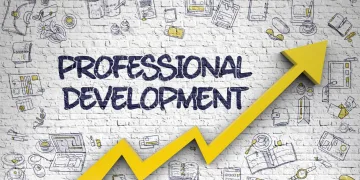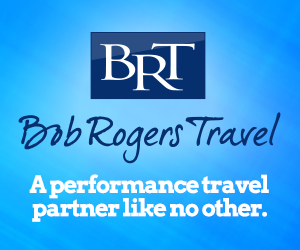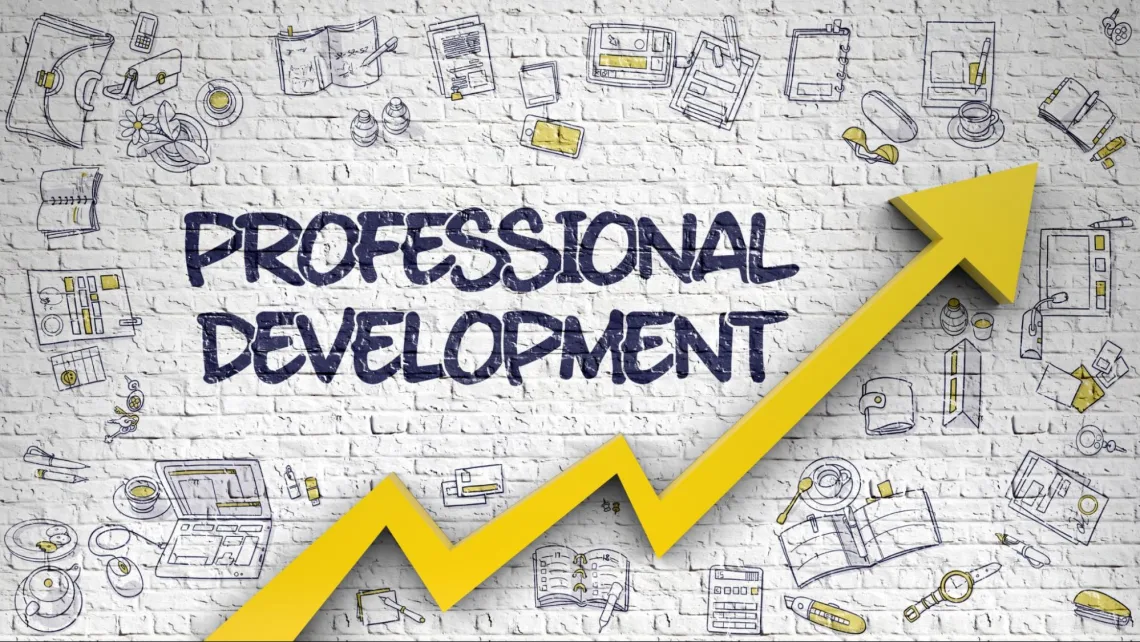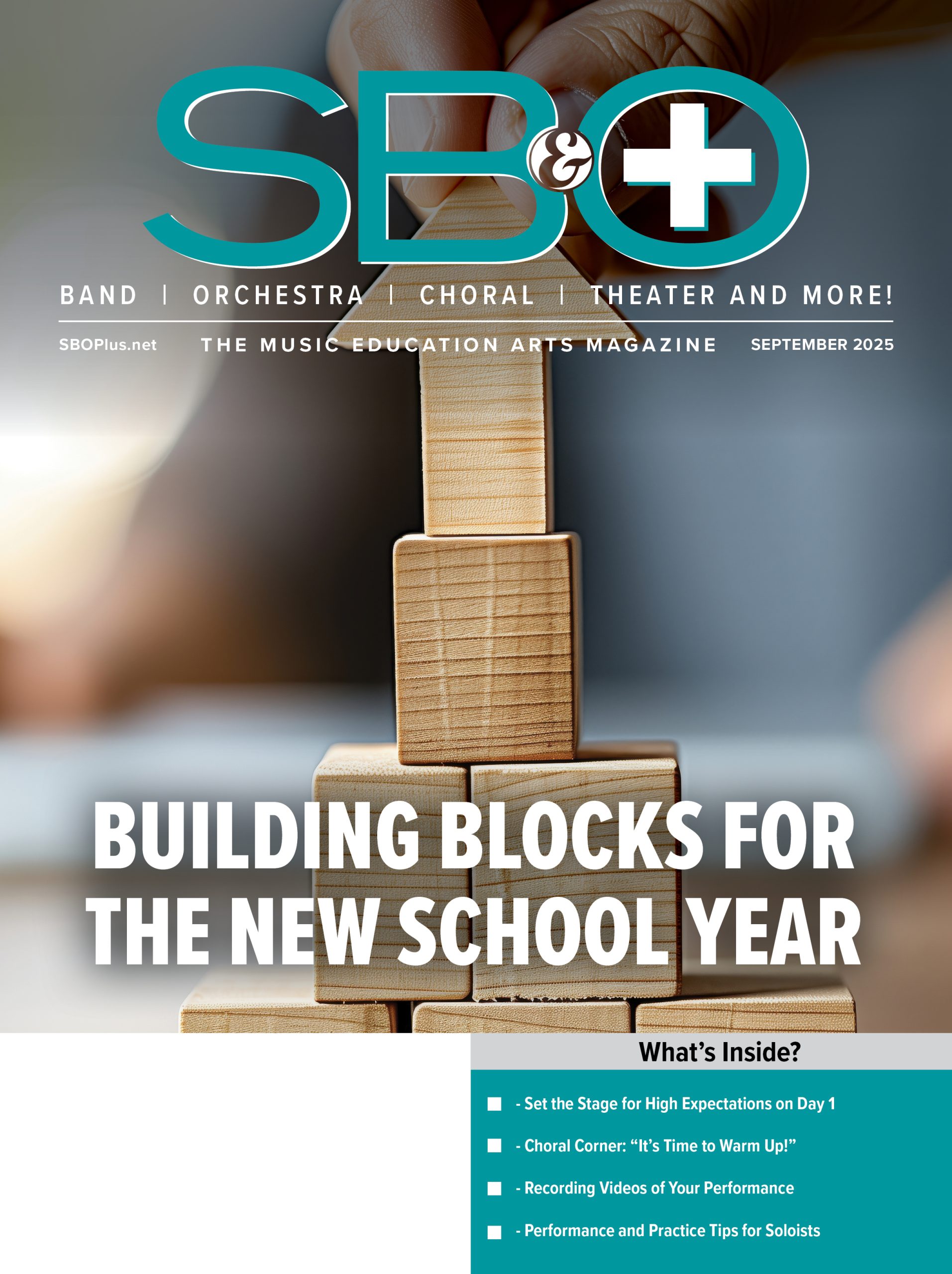Reprinted from American String Teacher with permission from ASTA and the authors.
Has your school or community music booster organization ever asked, “How can we help?” Replies of “New instruments! Volunteers! Supplies! Guest artists! Sheet music!” may quickly roll off the tongue. While all of these are surely important program supports, consider how often we include opportunities to further our own skills as string teachers in our replies. When do we ask to invest in our own professional growth as the primary student resource in our classrooms?
The Need for Professional Development
Teacher professional development is integral to providing quality instruction. When teachers are professionally engaged, they are better equipped to acquire resources to reach all students in their music program. While most schools provide site-based professional development activities, they are rarely geared toward the specific needs of string teachers and their students. String teachers are often the only orchestra experts in their school building, sometimes even in their district. While they see many string students every day, they may rarely have access to observing and learning alongside other string teachers.
Music classes are unique because teachers are required to have a wide depth and breadth of knowledge in addition to specialized skills to teach a wide range of class levels effectively. For this reason, professional music organizations fulfill a critical and necessary purpose. Organizations such as the American String Teachers Association (ASTA) and the National Association for Music Education (NAfME) provide many resources to fill this professional development gap. Professional music organization offerings include but are not limited to:
- Hosting clinics and conventions.
- Sponsoring competitions and judged events.
- Encouraging interaction among professionals.
- Publishing professional journals, discussion boards, and websites.
- Facilitating repertoire reviews.
- Mentoring new teachers.
Students benefit greatly from their music teachers’ professional development. When a teacher attends a workshop or meeting, they return to the classroom invigorated with new ideas, skills, and energy. New relationships often result in shared resources, strategies, guest artists, and teacher mentors. The teacher becomes up to date on best practices, new resources, and current examples of success. All of this is to the immeasurable benefit of students.
For teachers to take advantage of these opportunities, they must belong to professional organizations. This can mean paying out of pocket for several professional memberships in a single school year, in addition to participation fees for conventions, clinics, events, and more. Area-specific professional development is expected and financially supported in many practices including medicine, business, and academia. Why should professional string teaching be any different? ASTA provides a network of professionals pursuing excellence in string playing and teaching across the country.
Music Boosters Can Help
Did you know music booster organizations across the country support string teachers by budgeting for professional organization membership dues, professional development, and mentorship opportunities? School professional development budgets are often limited to or cover only a portion of state music conference attendance. While these resources should be used first, school districts rarely reimburse professional membership or specialized string training.
To help, music booster organizations can consider adding teacher professional development to their annual budgets. You, the teacher, can create a proposal asking your music booster organization to support your involvement in professional organizations such as ASTA. This can include reimbursing annual membership fees and/or support for attending string-specific professional development workshops, training, or the ASTA National Conference. Additional opportunities may include taking secondary instrument or conducting lessons, travel for teacher observation, or purchasing teaching texts and subscriptions.
Many music booster organizations already actively budget this as an annual teacher professional development line item. These supportive expenses may not be a large item in the music booster budget, but to the professional living on a teacher’s budget, it can be a huge help! Active support may be the gateway for music booster organizations incentivizing continuous music learning and growth for teachers to continually bring new ideas, perspectives, and resources to the school community.
While there is nothing quite like attending the ASTA National Conference, great opportunities for mentorship may also exist in your backyard. Mentors can be respected local teachers, national master teachers, university experts, or retired string teachers, to name a few. Set up a meeting or share a meal to troubleshoot both problems and possibilities. Investing in mentorship can help revolutionize a program and inspire a career.
Investing in Professional Development Opportunities
Consider asking your music booster organization to:
- Place professional development in the annual booster budget as a set amount line item. For most teachers, anything helps. This demonstrates support for string-specific professional development.
- Request music teachers submit an annual list of professional memberships they might need help paying for and which professional activities they believe would most greatly benefit the teacher and their students. The booster organization may choose which ones to help pay for or cover them all.
- Pay for a string-specific substitute when teachers are out of the building. Teachers are often required to personally pay for their substitutes when attending professional activities.
- Pay for a substitute to allow teachers to observe a master string educator during a school day. Teaching can be isolating, and the chance to observe other orchestra directors inspiring students in similar scenarios can be rare.
- Provide funding to bring a master teacher into your classroom to observe you teach and provide next-step feedback. Too often administrative evaluations are non-specific to music. Allowing invited experts to provide feedback directly to willing teachers can be powerful. These individuals help us see things we may not be seeing, recommend literature and resources, and problem-solve scenarios when we are boxed into our own thinking and strategies.
- Fund formal mentorship activities such as the ASTA state or national mentorship program or those from other professional organizations. Request funds to take a mentor-teacher out to dinner for program ideas. Supporting informal experiences lets teachers know they are valued and sends a message that an organization values a teacher’s professional growth. This can be especially powerful with early-career educators.
- Pay for a summer workshop or score study conducting lessons with a respected string educator or facilitate a secondary instrument lesson with a respected private studio teacher.
You likely know exactly the skills you need to target for your classroom. Your boosters can help you develop those skills.
Examples of Support
Boulder High School (CO), Ann Arbor Pioneer High School (MI), and Atholton High School (MD) are examples of exemplary orchestra programs that have built music booster organization support of teacher professional development as a cultural norm. Their booster organizations have come to both respect and invest in the continuing professional development of their orchestra teachers. For example,
High school full orchestra parent Sara K. advocates,
As a former music booster organization chairperson, and a parent of three former high school instrumental music students, I have seen firsthand the feasibility and benefits of booster organizations’ financial support for music teachers’ professional development specifically targeted at music education. The relatively small line item in our booster organization’s budget for professional development was far eclipsed by the benefits to students. Targeted music education professional development enables teachers to bring to the classroom innovative teaching techniques and strategies to the benefit of all instrumental music students.
Middle school orchestra parent Cathy F. similarly describes,
By providing funding for membership in professional organizations and the ability for teachers to attend conventions, I believe the experience for the students was positively impacted as teachers felt supported, informed, and exposed to new ideas in teaching. I was very involved in the parent musical support organization at our school and felt the teachers were very enthusiastic and knowledgeable about their subject matter and often spoke of the information they received after having attended music conventions.
High school orchestra parent Gwen B. shares,
As the chair of a high school instrumental music booster organization, I can attest to the incredible value of providing funding for teachers’ professional development and membership in music professional organizations. The net result of investing in teachers’ professional development has been an improved and richer experience for our program’s instrumental music students, which is a key goal of our parent organization!
It Starts with an Ask
You might be thinking, “I could never ask for that!” Some teachers may feel guilty allocating music booster organization resources in a way that does not appear to directly support students. Yet, ideas gleaned through professional affiliation, conferences, and mentorship provide a direct channel to foster innovative, meaningful, and current student engagement experiences.
To build toward an ask, consider asking teacher colleagues locally and nationally for other examples of strategic support. If you find none, innovate your own and lead by example! Similarly, if your own music booster organization is well established and invests in teacher professional growth, reach out to neighboring programs to help others become professionally engaged.
Consider providing documents, testimonials, or a personal endorsement to help support a colleague’s request for their music booster organization to support their string teacher’s growth.
Your parent booster organization can be your secret weapon in building and developing the orchestra program you envision. These volunteer parents want to help you and need you to tell them how. Next time you are asked “How can we help?” Remember, one of the best ways to help students is to invest in and further your own professional engagement and string teaching skills.





























